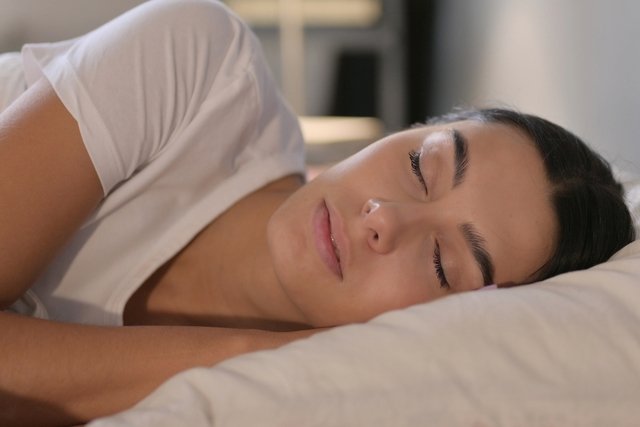Lack of sleep or difficultly falling asleep can interfere directly with your quality of life. A bad night of sleep can reduce your ability to concentrate during the day, and can lead to mood changes. When bad sleep is a frequent occurrence, it can change your appetite and cause health problems like stress, anxiety and memory loss.
Therefore, to achieve good sleep, you may need adopt some lifestyle changes that will help to regulate your sleep cycle so that you can reach a deep, relaxing state of sleep (which can be difficulty). For this to happen, you should set a time to fall asleep and adhere to it, sleep in a dark, comfortable space and drink a calming tea at least 30 minutes before going to bed.
Some tips to improve your sleep quality that you can consider are:

1. Set a bed time
On average, you should sleep 8 to 9 hours per night to be rested and alert in the morning. Therefore, if you need to wake up early, you should also go to bed early, even on weekends and holidays.
A good tip is to set an alarm on your phone to remember when you should go to bed. To avoid oversleeping, which will make you more awake the next night, you can consider leaving your phone or alarm clock far from your bed. That way, you need to get up to turn it off. You can do this for the first few nights, so that you can adhere to a sleep schedule.
2. Turn off the TV and other electronics
The television, computer and other electronics should be turned off at least 30 minutes before your bed time. Ideally, you should also refrain from using your cell phone and playing video games video games as these stimulate the brain and leave you more agitated, which can interfere with drowsiness.
In addition, your alarm clock should not be visible from your bed. If you wake up, you may have a tendency to check the time, which may cause you more stress and make it difficulty to fall asleep.
Some people area able to fall asleep while stimulated and fall asleep faster when they are able to here a calm or rhythmic sound, therefore it may be a good idea to put on some ambient music.
3. Read before falling asleep
Ideally you should only lie in bed when you are sleepy. To fall asleep, you can sit up in bed, or ideally sit on a sofa, and read a book in dim light. It is important to pick a book with content that is peaceful and soothing. You should avoid books or stories that promote tension and stress, like the newspaper.
4. Create a dark space
Before falling asleep, you should turn off the lights and only leave a lamp on. This lamp should emit yellow light, which is favorable for falling asleep. Alternatively, you can light a candle- The objective is to make your room comfy to bring on your sleepiness and have a good night’s rest.
5. Naps after lunch
A 10 to 30 minute nap right after lunch is sufficient for you to relax without interfering with your night sleep. You should not take prolonged naps during the day, as they can make you less sleepy for bedtime. Long naps during the day are only advised for babies and children up to 4 years old.
6. Exercise regularly
Exercising at least 30 minutes every day prior to 9pm can be beneficial as exercising wastes more energy and makes you more tired at the end of the day. People who are unable to attend a gym can try walking or riding a bike prior to dinner.
Physical activity after 9pm is not recommended, as it may have the opposite effect. Exercise can boost your mood and energy level, which can compromise your bed time and sleep quality.
7. Avoid drinking coffee before bed
Drinking stimulating drinks, like soda, coffee, black tea, or green tea, should be avoided 6 hours before bed. These drinks can leave you more awake and make it difficult to fall asleep. You should also avoid eating too much at dinner.
When possible, you should have drinks that stimulate sleep, like warm milk or a glass of red wine.
8. Drink tea before bed
Drinking a soothing tea before going to bed and help induce sleep and keep you asleep better. Some teas with these properties are valerian, passionflower, lemon balm, chamomile and lavender. Learn more about teas for insomnia and how to prepare them.
9. Use a relaxing essential oil
Using essential oils like lavender can have a relaxing and calming effect. Inhaling deeply with these essential oils can bring more oxygen to the brain and stimulate hormone production, which can lead to a sensation of wellbeing and promote sleep.
To use these oils, you can place 2 or 3 drops of it on your pillow or pajama before falling sleep. You can also add these oils to a humidifier or spray them throughout your room.
10. Keeping quiet and being comfortable
You should avoid noisy environments before going to sleep. You can use earplugs to help block out any unnecessary sound.
On the other hand, some people require deep noise to be able to fall sleep, also known as white noise. Examples include the sound from a washing machine, an exhaust fan or a radio in-between channels. In addition, there are some apps you can download that produce white noise to help you fall asleep.
Your room and your sleep clothing you should also be comfortable. Ideally, your curtains should keep your room dark during the night and your room should be at a comfortable temperature (between 18ºC to 21ºC, or 64.5ºF to 70ºF). Your pillow should also be comfortable, and should relieve any built-up tension in the back and neck.
